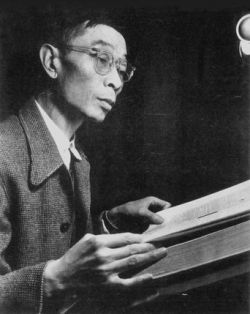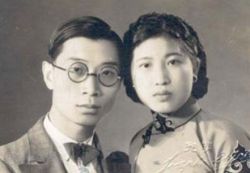Fu Lei
Fu Lei (傅雷) was a famous Chinese translator and art critic. His family letters to his sons Fu Cong and Fu Min were published posthumously and have become a bestseller in China to this day.
Born on April 7, 1908 in Nanhui, Shanghai, Fu Lei was originally named fu Nu'an.
In 1924, he entered the high school affiliated with Datong University in Shanghai. In 1925, he wrote the short story "In a Dream" and the following year "A Scene from Nostalgia." In the autumn of the 1926, he entered Chizhi University and in December the following year he went to France to study at his own expense. His Letters Sent on a Trip to France was published in 1928.
He studied at the Sorbonne while attending classes in the history of art at ecole du Louvre. He began to translate the works of A. Daudet (1840-97) and P. Merimee (1803-70). In 1929, he published his first collection of translations. In November 1931, he co-edited with Liu Haisu An Album of World Famous Paintings. In 1933, he set up a periodical, Art, with the help of Ni Yide, and from October to May the following year, he also contributed regularly to Lamp of Learning, a supplement to the newspaper News of Current Events. In 1934, he co-founded with Ye Changqing the weekly Current Affairs and worked as its editor-in-chief. Meantime, he wrote Twenty Lectures on world Masterpieces of Paintings and completed his translation of a lengthy piece called London Today.
During the War of Resistance Against Japan, he took part in various social and literary activities and also engaged in activities against Chiang Kai-shek, the head of the Kuomintang government. In May 1945, he launched the bi-weekly Fresh Talk with Zhou Xuliang and helped form the China Association for Promoting Democracy, and anti-civil war organization. This decade saw the publication of his other translations, of which he most voluminous would be Romain Rolland's novel Jean Christophe. His other translations include Rolland's Beethoven and Balzac's Le Pere Goriot.
Most of his translations were published after 1949. he translated most of Balzac's works, including La Cousin Bette, Eugenie Grandet, Le Cousin Pons, Le Colonel Chabert, and Illusions perdues. In 1963, he became a permanent member of the Society for the Study of H. Balzac. He also translated Philosophie de l'art by H. A. Taine (1828-93), the French philosopher and historian. However, he was wrongly labeled a Rightist in 1958, and was cruelly insulted during the Cultural Revolution. In protest of the witch-hunt against them, Fu Lei and his wife Zhu Meifu committed suicide on the night of September 3, 1966.
An eminent translator, Fu performed liberal to literal renditions, and his works always testify to his aesthetic conception of translating in clear and elegant language.
His main works include "In a Dream" (1926), "A Scene from nostalgia" (1927), Letters Sent on a Trip to France (1928), R. Rolland's Jean Christophe (1941), "On Zhang Ailing's Fictional Works" (1944), R. Rolland's Beethoven (1946), H. Balzac's Le Pere Goriot (1946), H. Balzac's Eugenie Grandet (1951), "On Zhao Shuli's Sanliwan Village (1956), "My experience in Translation" (1957), and H. Taine's Philosophie de l'art (1963).
On Oct. 27, 2013, the ashes of Fu Lei and his wife were finally moved to their place of birth, Pudong New Area in Shanghai. Relatives and friends attended the burial ceremony.

